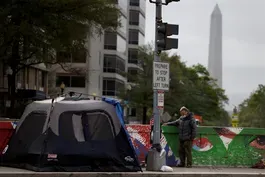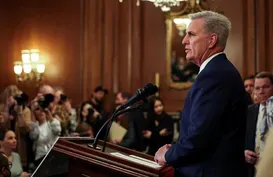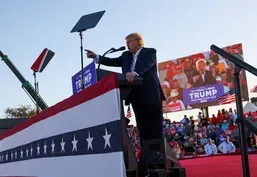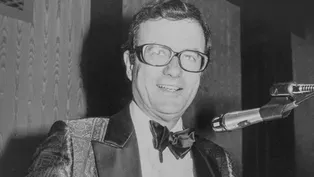
Russia arrests American journalist on spying charges
Clip: 3/30/2023 | 12m 17sVideo has Closed Captions
Russia arrests American journalist Evan Gershkovich on spying charges
For the first time in nearly 40 years, Russian authorities arrested an American journalist on espionage charges. Evan Gershkovich of the Wall Street Journal was detained on Wednesday while reporting in central Russia. It’s an escalation of a Kremlin campaign that has targeted independent media, opposition politicians and critics of the full-scale invasion of Ukraine. Nick Schifrin reports.
Problems with Closed Captions? Closed Captioning Feedback
Problems with Closed Captions? Closed Captioning Feedback
Major corporate funding for the PBS News Hour is provided by BDO, BNSF, Consumer Cellular, American Cruise Lines, and Raymond James. Funding for the PBS NewsHour Weekend is provided by...

Russia arrests American journalist on spying charges
Clip: 3/30/2023 | 12m 17sVideo has Closed Captions
For the first time in nearly 40 years, Russian authorities arrested an American journalist on espionage charges. Evan Gershkovich of the Wall Street Journal was detained on Wednesday while reporting in central Russia. It’s an escalation of a Kremlin campaign that has targeted independent media, opposition politicians and critics of the full-scale invasion of Ukraine. Nick Schifrin reports.
Problems with Closed Captions? Closed Captioning Feedback
How to Watch PBS News Hour
PBS News Hour is available to stream on pbs.org and the free PBS App, available on iPhone, Apple TV, Android TV, Android smartphones, Amazon Fire TV, Amazon Fire Tablet, Roku, Samsung Smart TV, and Vizio.
Providing Support for PBS.org
Learn Moreabout PBS online sponsorshipGEOFF BENNETT: For the first time in nearly 40 years, Russian authorities have arrested an American journalist and charged him with espionage.
Evan Gershkovich of The Wall Street Journal was detained by intelligence agents yesterday while reporting in Central Russia.
It's an escalation of a Kremlin campaign that has targeted independent media, opposition politicians and any critics of the full-scale invasion of Ukraine.
Nick Schifrin begins our coverage.
NICK SCHIFRIN: It's a moment not seen since the Cold War, an American journalist accused of espionage detained by Russian police.
Russian intelligence agents arrested Evan Gershkovich as he reported 900 miles east of Moscow.
Police took him into a closed court hearing, and the federal security service, or FSB, accused him of -- quote -- "acting on instructions from the American side to collect information about the activities of one of the end reprises of the Russian military industrial complex that constitutes a state secret."
MARIA ZAKHAROVA, Spokeswoman, Russian Foreign Ministry (through translator): Under the cover of journalist activity, this person has been involved in a completely different kind of activity.
What he has been doing in your Yekaterinburg -- I'm speaking about this case only for now -- is not journalism.
NICK SCHIFRIN: In response, The Wall Street Journal said it "vehemently denies the allegations from the FSB and seeks the immediate release of our trusted and dedicated reporter."
KARINE JEAN-PIERRE, White House Press Secretary: The charges against him are ridiculous.
NICK SCHIFRIN: In Washington, the U.S. said it was trying to gain consular access and warned Americans living in Russia to leave.
KARINE JEAN-PIERRE: This is incredibly, sadly, common for Russia to detain Americans.
And that's why we have been very clear about Americans not going to Russia.
It is not safe for Americans right now in Russia.
NICK SCHIFRIN: Today, Russia holds another American, former Marine Paul Whelan, arrested in December 2018.
A Russian court convicted him on espionage charges that Whelan and the U.S. called a sham.
But in today's Russia, it is Russians who are most often targeted.
The Committee to Protect Journalists as at least seven Russian journalists have been arrested and charged since the full-scale invasion of Ukraine.
This week, single father Alexei Moskalyov face punishment for questioning the war on social media.
Russian authorities investigated him after his daughter made this school drawing: "Glory to Ukraine.
No to war."
Authorities separated them.
She was forced to an orphanage and he faces two years in prison.
He fled and was detained in Belarus.
But the daughter has been trying to comfort the father.
She wrote a letter: "Please don't worry about me.
Please don't give up.
I love you.
You're my hero."
Since the invasion, the human rights organization OVD-Info says police have detained nearly 20,000 for criticizing the war, among them, opposition leader Vladimir Kara-Murza.
He is a longtime Kremlin critic and target.
Twice, he's been poisoned.
VLADIMIR KARA-MURZA, Russian Opposition Politician: I couldn't breathe.
And, at this stage, when you're lying there, trying to gas for air, I think I felt just life slowly going out of the whole body.
NICK SCHIFRIN: We interviewed him and his wife, Evgenia, in 2017.
And yet, after that, after the full-scale invasion, he returned to Russia to continue his work.
Last April, authorities arrested him.
He's now on trial for high treason.
Have you ever asked him not to go back?
EVGENIA KARA-MURZA, Wife of Vladimir Kara-Murza: It is terrifying.
I'm not going to lie to you, but I want him to continue to do what he thinks is important, what he thinks is right.
NICK SCHIFRIN: And now Evgenia has continued Vladimir's work.
She is the Free Russia Foundation's director for advocacy.
She vows to keep fighting for her husband and for justice for as long as it takes.
For the "PBS NewsHour," I'm Nick Schifrin.
GEOFF BENNETT: And with us once again is of Evgenia Kara-Murza.
And Andrew Weiss joins us, vice president for studies at the Carnegie Endowment for International Peace.
He served in the George H.W.
Bush and Clinton administrations.
Thank you both for being here.
Evgenia, I will start with you, because Russia earlier this month began the closed-door trial of your husband.
He faces more than two decades in prison on charges, including treason for comments critical of the Kremlin.
How is he doing?
And how is his case unfolding?
EVGENIA KARA-MURZA: Thank you very much for having me here.
Everything in my husband's case, as you said, is happening behind closed doors.
The entire trial is happening behind closed doors, because, of course, the Russian authorities are afraid to give him a platform, even if it is a courtroom, to speak.
And he will continue to speak out.
He will continue to oppose this regime, as he has been doing for all these years.
And, yes, the accusations against him include the dissemination of knowingly false information about the war in Ukraine, or, in other words, denouncing the war crimes committed by the Russian army on the territory of Ukraine and calling for the creation of a tribunal, Nuremberg-style tribunal, to prosecute all those responsible, and high treason, as you mentioned, for public speeches that he made on different international platforms, in which he denounced the regime, talked about political persecution in Russia and the ever-growing number of political prisoners in the Russian Federation.
GEOFF BENNETT: How are detainees like your husband treated?
EVGENIA KARA-MURZA: Oh, well, it really depends.
I can tell you that the Russian authorities are now using a whole spectrum of intimidating techniques and repressive mechanisms that include the use of punitive psychiatry, torture, sexual violence, all -- and prison terms that can go up to 15 years for just saying no to the war, for protesting against it in any way, even by making a post on social media, putting a like under someone else's post, for reposting information.
They called it dissemination of knowingly false information about the war, about the special operation.
And for any kind of protests against the official narrative.
The current Russian regime wants to portray anyone who opposes the official narrative as either criminal, an insane person, or a traitor.
This is what we have in Russia today.
GEOFF BENNETT: Vladimir Putin is focused on suppressing dissent.
But you, as I understand it, say it's a mistake to believe that he has been successful in suffocating the resistance movement.
EVGENIA KARA-MURZA: Absolutely.
I believe that he very much depends on creating this image for the entire world, this image in which the entire Russian population stands behind him and the war.
The number of people detained over the last year -- and that's over 20,000 people -- for protesting against the war and against the official Kremlin policies -- show that there are probably millions of people who are against what is happening, but are afraid to speak up, because they see what happens to those who do, who dare to oppose the regime.
GEOFF BENNETT: Andrew Weiss, the Biden White House today condemned the detention of the American Wall Street Journal reporter Evan Gershkovich for what Moscow described as espionage.
The White House national security spokesperson, John Kirby, said the administration had no advance awareness of a new Russian effort to target American journalists.
Does -- does his detention read to you like a stepped-up effort on the part of the Russians to target Americans, with the end goal of a prisoner swap?
ANDREW WEISS, Carnegie Endowment for International Peace: It's really hard to speculate at this point, given how few concrete facts have been released.
And we always need to be really careful not to assume that what the Russians are saying is true.
In this instance, a small number of Western journalists have gone back or gone in and out since the war began.
At the beginning of the war, everyone left.
And the message from the U.S. administration has been really clear: No Americans should be in Russia right now, due to the threat of arbitrary detention, or worse.
And now you have something that looks much worse, which is espionage charges that carry with them, as Ms. Kara-Murza was saying, real potential for a very long prison sentence.
GEOFF BENNETT: The official Russian line is that he is a spy.
The White House today said that's completely unsubstantiated.
If you look at his recent reporting, though, he was writing about Russia's economic struggles, its troubles on the battlefield, the Wagner Group, a paramilitary force with ties to Putin.
Does any of that suggest to you why he might have been targeted?
ANDREW WEISS: The Western reporters who have gone back to Russia for these short-term reporting trips have really punctured the veil of lies.
And they have been able to report and tell the world the truth about how Russian society is reacting to the war, the problems in the economy, and the problems within the Russian security establishment.
The Russian government doesn't like criticism, doesn't like scrutiny.
And in a situation like this, I think they are trying to push Western journalists back out of the country and make it clear that, if Mr. Gershkovich can be targeted, so can you.
GEOFF BENNETT: We saw what it took to secure the release of Brittney Griner.
Paul Whelan has been in Russia, held captive, for more than four years.
What are the prospects facing Evan Gershkovich?
ANDREW WEISS: It's a grim picture at the moment.
No one who has been formally accused of espionage or treason has been acquitted in Russia since the late 1990s.
There was one case in the Cold War era, in 1986, of a Western journalist, Nicholas Daniloff, who was arrested on espionage charges.
He was released in a complex maneuver involving the U.S. and Soviet governments at that time.
He wasn't convicted of espionage.
So I think the focus right now has to be on not treating the Russian assertions as accurate -- i think it's, on its face, a laughable accusation -- but also being really careful to do whatever we can to make sure that we don't endanger Mr. Gershkovich more than he already is.
GEOFF BENNETT: Evgenia, as we wrap up our conversation, what do you make of that?
And what are we to make of this current moment?
EVGENIA KARA-MURZA: Well, this is a regime that does not value human life, has never valued human life.
This is a regime that has been committing those kinds of crimes, including war crimes, for years.
This regime has already committed war crimes in Chechnya and in Syria.
It has already carried out acts of aggression against our neighbors in Georgia and in Ukraine in 2014 by annexing Crimea.
This is a regime that holds -- the longest-serving Russian political prisoner is Alexey Pichugin.
He's been behind bars for 20 years, in violation of two decisions of the European Court of Human Rights and several demands by the Committee of Ministers for his immediate release.
This is a regime that held over 300 political prisoners even before the full-scale invasion of Ukraine.
Now the numbers are growing by the day.
It will take hostages.
It will try to erase Ukraine from the face of the earth.
It will accompany this war of aggression by genocide.
It will do all the possible -- carry out all the possible crimes against its own population.
This is why this regime has to come down.
It has to be brought down.
The only way for Russia to stop being a threat to itself and to its neighbors is for it to become a democracy.
This regime cannot be transformed into a democracy.
It has to stand trial for all the crimes committed against the Russian people and against everyone else around.
This is the only way.
GEOFF BENNETT: Andrew Weiss, our thanks to you.
And, Evgenia Kara-Murza, our thoughts are with you, your family and your husband, Vladimir.
Thank you.
D.C. phases out COVID-era hotel housing program for homeless
Video has Closed Captions
Clip: 3/30/2023 | 7m 34s | D.C. phases out its COVID-era hotel housing program for homeless people (7m 34s)
Debate over raising debt ceiling heats up on Capitol Hill
Video has Closed Captions
Clip: 3/30/2023 | 6m 5s | Debate over raising debt ceiling heats up on Capitol Hill (6m 5s)
Grand jury indicts Trump in Stormy Daniels hush-money case
Video has Closed Captions
Clip: 3/30/2023 | 6m 23s | New York grand jury indicts Trump in Stormy Daniels hush-money case, lawyer says (6m 23s)
Judge rules against key ACA preventative care requirements
Video has Closed Captions
Clip: 3/30/2023 | 5m 18s | Federal judge rules against key preventative care requirements of Affordable Care Act (5m 18s)
'Nine Parts' explores lives of Iraqi women after war
Video has Closed Captions
Clip: 3/30/2023 | 7m 56s | New film 'Nine Parts' explores lives of Iraqi women after U.S. invasion (7m 56s)
Political satirist Mark Russell dies at 90
Video has Closed Captions
Clip: 3/30/2023 | 1m 7s | Political satirist and comedian Mark Russell dies at 90 (1m 7s)
Providing Support for PBS.org
Learn Moreabout PBS online sponsorshipSupport for PBS provided by:
Major corporate funding for the PBS News Hour is provided by BDO, BNSF, Consumer Cellular, American Cruise Lines, and Raymond James. Funding for the PBS NewsHour Weekend is provided by...

















